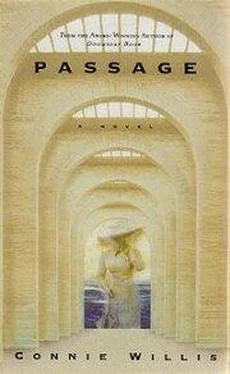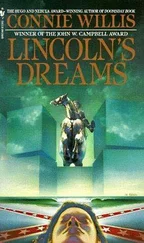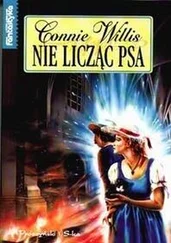Richard took the energy bar away from her, tore it open, and handed it back to her.
“Thanks,” she said. “The problem is Mr. Mandrake’s book and all the near-death-experience stuff out there. They’ve told people what they should see, and sure enough, they all see it.”
He frowned. “Then you don’t think people actually see a tunnel and a light and a divine figure?”
She took a bite of energy bar. “I didn’t say that. NDEs didn’t start with Mr. Mandrake or this current crop of books. There are accounts dating all the way back to ancient Greece. In Plato’s Republic, there’s an account of a soldier named Er who died and traveled through passageways leading to the realms of the afterlife, where he saw spirits and something approaching heaven. The eighth-century Tibetan Book of the Dead talks about leaving the body, being suspended in a foggy void, and entering a realm of light. And most of the core elements seem to go way back.”
She took another bite. “It’s not that people don’t see the tunnel and all the rest. It’s just that it’s so hard separating the wheat from the chaff. And there’s tons of chaff. People tend to use NDEs to get attention. Or to stump for their belief in the paranormal. Twenty-two percent of people who claim they’ve had NDEs also claim to be clairvoyant or telekinetic, or to have had past-life regressions like Bridey Murphy. Fourteen percent claim they’ve been abducted by aliens.”
“So how do you separate the wheat from the chaff, as you call it?”
She shrugged. “You look for body language. I had a patient last month who said, ‘When I looked at the light, I understood the secret of the universe,’ which, by the way, is a common comment, and when I asked her what it was, she said, ‘I promised Jesus I wouldn’t tell,’ but as she said it, she put her hand out, as if reaching for something just out of her grasp,” Joanna said, demonstrating. “And you look for experiences outside the standard imagery, for consistency. People tend to include many more specific details, some of them seemingly irrelevant, when they’re describing what they’ve actually experienced than when they’re describing what they think they should have seen.”
“And what have they actually experienced?” Richard asked.
“Well, there’s definitely a sensation of darkness, and a sensation of light, usually in that order. There also seems to be a sound of some kind, though nobody seems to be able to describe it very well. Mr. Mandrake says it’s a buzzing—”
“—so all of his patients say it’s a buzzing,” Richard said.
“Yes, but even they don’t sound all that convinced,” Joanna said, remembering the uncertainty in Mrs. Davenport’s voice. “And my subjects are all over the map. It’s a click, it’s a roar, it’s a scraping sound, and it’s a shriek.”
“But there definitely seems to be a sound?”
“Oh, yes, eighty-eight percent of my patients mentioned it. Without prompting.”
“What about the floating-above-your-body-on-the-operating-table?” Richard asked, pulling a box of raisins out of his pocket.
“Mr. Mandrake claims sixty percent of his patients have an out-of-body experience, but only eleven percent of mine do. Seventy-five percent of mine mention feelings of peacefulness and warmth, and nearly fifty percent say they saw some kind of figure, usually religious, usually dressed in white, sometimes shining or radiating light.”
“Mandrake’s Angel of Light,” Richard said.
She held out her hand, and he tipped some raisins into her palm. “Mr. Mandrake’s brainwashees see an Angel of Light and their dead relatives, waiting to greet them on the Other Side, but for everyone else, it seems to be religion-specific. Christians see angels or Jesus unless they’re Catholics, then they see the Virgin Mary. Hindus see Krishna or Vishnu, non-believers see relatives. Or Elvis.” She ate a raisin. “That’s what I mean about chaff. People bring so many biases from their own background, it’s almost impossible to know what they actually saw.”
“What about children?” he asked. “Don’t they have fewer preconceived ideas?”
“Yes,” Joanna said, “but they’re also more apt to want to please the adult who’s interviewing them, as proved by the nursery-school-abuse cases of the eighties. Children can be manipulated to say anything.”
“I don’t know,” he said doubtfully. “I met a little girl today who didn’t look too influenceable. You know her. Maisie?”
“You talked to Maisie Nellis?” she said, and then frowned. “I didn’t know she was back in again.”
Richard nodded. “She told me to tell you she has something important to tell you. We had quite a chat about the Hindenburg.”
She smiled. “So that’s the disaster of the week?”
He nodded. “That and the Great Molasses Flood. Did you know that twenty-one people met a pancakelike death in 1919?”
“How long were you there?” she laughed. “No, let me guess. Maisie’s wonderful at thinking up excuses for why you have to stay just a little longer. She’s one of the world’s great stallers. And one of the world’s great kids.”
He nodded. “She told me she has cardiomyopathy and that she’d gone into V-fib.”
Joanna nodded. “Viral endocarditis. They can’t get her stabilized, and she keeps having reactions to the antiarrhythmia drugs. She’s a walking disaster.”
“Hence the interest in the Hindenburg,” he said.
She nodded. “I think it’s a way of indirectly addressing her fears. Her mother won’t let her talk about them directly, won’t even acknowledge the possibility that Maisie might die,” she said. “But more than that, I think Maisie’s trying to make sense of her own situation by reading about other people who’ve had sudden, unaccountable, disastrous things happen to them.” She ate another raisin. “Plus, children are always fascinated by death. When I was Maisie’s age, my favorite song was ‘Poor Babes in the Wood,’ about two children ‘stolen away one bright summer’s day’ and left in the woods to die. My grandmother used to sing it to me, to my mother’s horror. The elderly are fascinated by death, too.”
“Did they?” Richard asked curiously. “Die? The babes in the wood?”
She nodded. “After wandering around in the dark for several stanzas. ‘The moon did not shine and the stars gave no light,’ ” she recited. “ ‘They wept and they sighed, and bitterly cried, and the poor little children, they lay down and died.’ After which the birds covered them with strawberry leaves.” She sighed nostalgically. “I loved that song. I think because it had children in it. Most of Maisie’s disasters involve children. Or dogs.”
Richard nodded. “There was a dog on the Hindenburg. Named Ulla. It survived the crash.”
She wasn’t listening. “Did she say what she wanted to talk to me about?”
“Near-death experiences.”
“Oh, dear, I hope she didn’t go into V-fib and code again.”
“I don’t think so. She was up and around. The nurse had a hard time keeping her in bed.”
“I should go see her,” Joanna said, looking up the stairs.
She crept up them and opened the door a crack. “…an Angel of Light, with golden light radiating from him like sparkling diamonds,” Mr. Mandrake was saying.
She eased the door shut. “Still there.”
“Good,” Richard said, “because I haven’t had a chance to convince you to come work with me on my project yet, and you haven’t finished telling me what people experience during an NDE. And we haven’t had dessert yet.” He reached in his lab coat pocket and pulled out a package of peanut M&M’s.
Читать дальше












